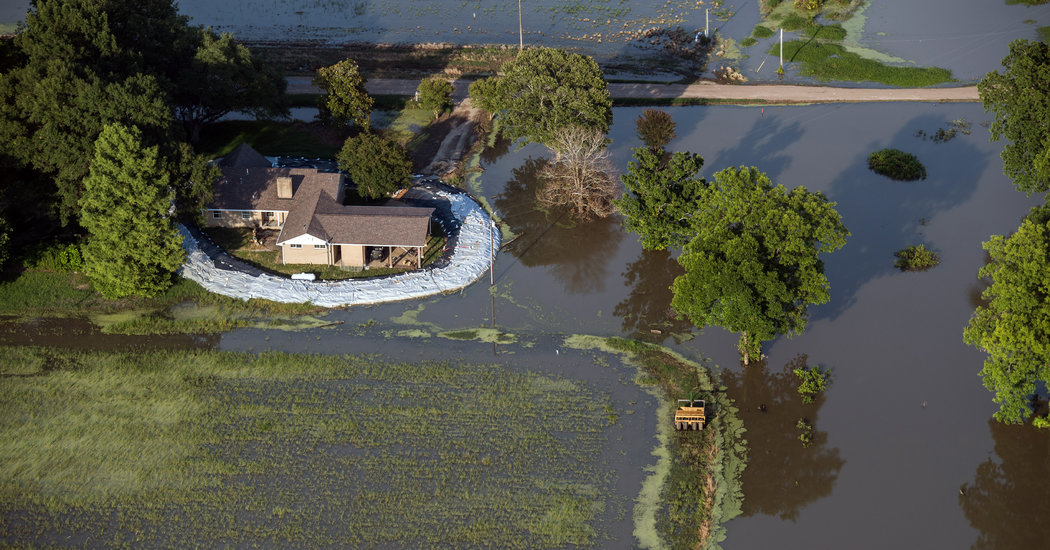Floodwaters swamped more than half a million acres of forest and farmland in the lower Mississippi Delta more than six months ago, gulping up highways and homes, livestock and tractors. This week, for the first time since, the river gauge at Vicksburg on the western border fell below flood stage.
“This is biblical proportion,” Paul Hartfield, an endangered species biologist with the United States Fish and Wildlife Service, said of the floods. “Nothing like this has ever been seen.”
Climate change is increasingly turning the extraordinary into the ordinary. Extreme floods and snowfall, at times moving to extreme heat and droughts, are forcing cities and farming communities across the country to grapple with the threat to their homes and livelihoods.
In the Yazoo Basin, a section of the delta where farming is the linchpin of the economy, people are still struggling to cope with a flood that seems forgotten by nearly everyone outside the disaster zone.
Hours tick by with absolutely nothing to do. Fields where towering corn and chest-high soybean crops normally grow are saturated with water. Sandbag levees still surround many houses, forcing people to wear fishing waders and boat in and out of their homes.
Flooding is a perennial part of life in this low-lying rural region. Relentless rains this year, combined with drenching storms that brought devastating floods across much of the Midwest and halted barge traffic, funneled much more water downriver than usual and compounded the damage.
The surge of freshwater, for example, has killed sea porpoises and turtles and created a toxic algal bloom along the state’s gulf coast some 300 miles away, closing all the beaches.
Farmers with crop insurance should be able to hang on for another year, but other business owners and workers in this sparsely populated area worry whether the local economy will survive. Banks aren’t making crop loans. Farmers aren’t buying seed, fertilizer and tractors. Grain elevators are empty, and cotton gins sit silent. Fields remain under water.
The summer months have brought some respite from the rain, but the heat has been intense.
“Last week, it was hotter than the fires of hell down here,” said Chris Libbey, who lives year-round in Eagle Lake, a vacation and hunting spot.
He still has four feet of water in his front yard, but because his house is built on stilts, it escaped most damage. He put up scaffolding outside the back door and drives a boat to get around.
“Millions of gallons need to be pumped,” Mr. Libbey said, and “until we get this water pumped we still have 200 residents who can’t get to their homes.”
“We’re a small community, and it ripples down,” said Andy Anderson, the chief executive of Anguilla Bank, the only local bank in Sharkey and Issaquena Counties, where the combined population totals 5,774. “It ripples into the churches, it ripples into the schools, and several businesses here are feeling the crunch.”
Hunting brings in tourists and income during the winter months, but the deer population has been so thinned that the season could be curtailed or canceled altogether.
Wayne Ricks, a John Deere salesman who has worked at the company for more than 46 years, said sales were down and were likely to drop further.
Lately, Mr. Anderson said, the bank has been making small loans — a couple of hundred dollars for one family to buy groceries, and for another to purchase clothes at Walmart to replace some of what was destroyed.
Rolling Fork is near the birthplace of Muddy Waters, the king of the Chicago Blues, and next to the County Courthouse, a Blues Trail marker honors the singer and guitarist. It’s the biggest town in the area and was mostly spared the flood but not the aftereffects. At Chuck’s Dairy Bar, there are many fewer orders of Chuckburgers and strip steak.
“The bulk of our business does come from the farming community, and that part has been almost cut in half,” said Tracy Harden, the owner. She has 11 full-time workers and four part-timers. “We are just struggling to keep everyone employed,” she said.
A complex series of levees built around the Yazoo Backwater area between the Yazoo and Mississippi Rivers has turned the zone into an enormous triangular-shaped bathtub. The latest flooding has prompted residents and state officials to revive calls for a massive federal hydraulic pumping project near the metal gates that now sit astride the Steele Bayou.
The Vicksburg District of the Corps of Engineers supports the pumping project, which was first proposed in 1941. But a broad range of opponents argue the costly plan would devastate vital wetlands, hardwood forests and wildlife, and affect bird species that migrate through the region. They warn it would also worsen flooding further south.
In 2004, Senator John McCain, Republican of Arizona, called the Yazoo pumps “one of the worst projects ever conceived by Congress.” And under President George W. Bush, the Environmental Protection Agency vetoed it in 2008.
The agency is now reviewing that decision.
For residents, the necessity of the pumps seems self-evident.
The slowly receding waters have yet to reveal the full extent of the damage not only to farmland, roads, wildlife and businesses, but to the levees, locks and dams that undergird the system.
Many people are going to have to start all over, Paul Hollis, the Sharkey County commissioner on the Mississippi Levee Board, said. For homes that have been submerged for months, the only option may be a bulldozer.
“We don’t know what we’ve got until the water is completely out of here,” he said. “There’s so much unknown until then.”

